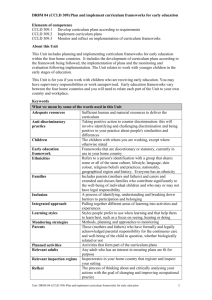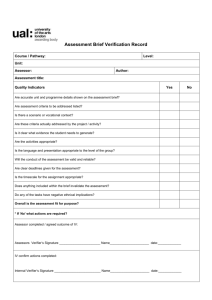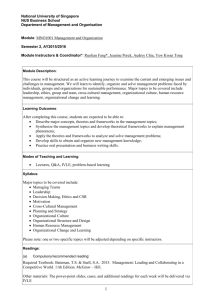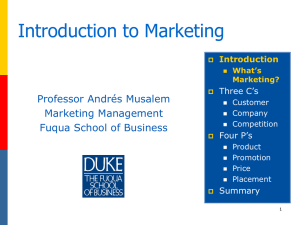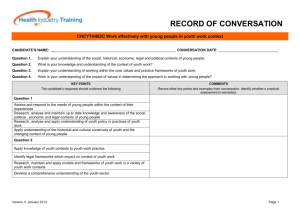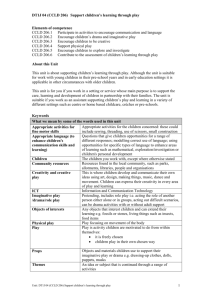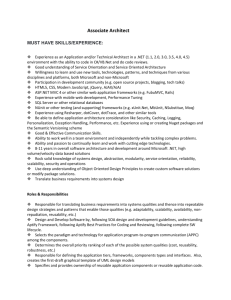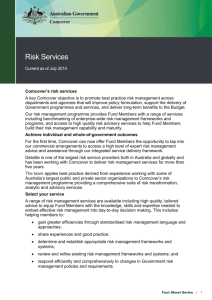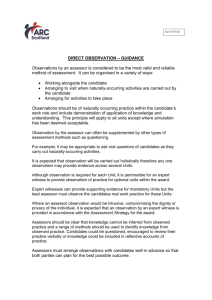CCLD 310
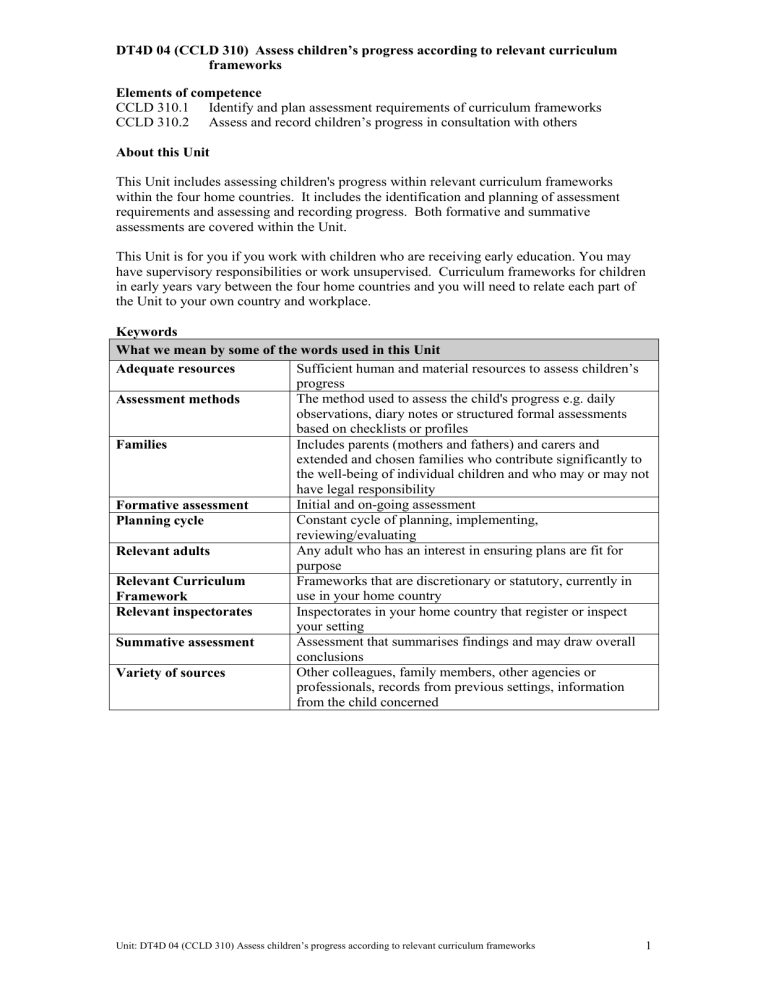
DT4D 04 (CCLD 310) Assess children’s progress according to relevant curriculum frameworks
Elements of competence
CCLD 310.1 Identify and plan assessment requirements of curriculum frameworks
CCLD 310.2
Assess and record children’s progress in consultation with others
About this Unit
This Unit includes assessing children's progress within relevant curriculum frameworks within the four home countries. It includes the identification and planning of assessment requirements and assessing and recording progress. Both formative and summative assessments are covered within the Unit.
This Unit is for you if you work with children who are receiving early education. You may have supervisory responsibilities or work unsupervised. Curriculum frameworks for children in early years vary between the four home countries and you will need to relate each part of the Unit to your own country and workplace.
Keywords
What we mean by some of the words used in this Unit
Adequate resources
Sufficient human and material resources to assess children’s
Assessment methods progress
The method used to assess the child's progress e.g. daily observations, diary notes or structured formal assessments based on checklists or profiles
Families
Formative assessment
Planning cycle
Relevant adults
Includes parents (mothers and fathers) and carers and extended and chosen families who contribute significantly to the well-being of individual children and who may or may not have legal responsibility
Initial and on-going assessment
Constant cycle of planning, implementing, reviewing/evaluating
Any adult who has an interest in ensuring plans are fit for purpose
Relevant Curriculum
Framework
Relevant inspectorates
Summative assessment
Variety of sources
Frameworks that are discretionary or statutory, currently in use in your home country
Inspectorates in your home country that register or inspect your setting
Assessment that summarises findings and may draw overall conclusions
Other colleagues, family members, other agencies or professionals, records from previous settings, information from the child concerned
Unit: DT4D 04 (CCLD 310) Assess children’s progress according to relevant curriculum frameworks 1
DT4D 04 (CCLD 310) Assess children’s progress according to relevant curriculum frameworks
Evidence Requirements for the Unit
It is essential that you adhere to the Evidence Requirements for this Unit
GENERAL GUIDANCE
Evidence must be provided for ALL of the performance criteria and ALL of the knowledge.
Work with children and families does not lend itself to a series of fragmented activities. When assessment planning it is essential that assessors and candidates identify opportunities to integrate a number of activities for assessment on any particular occasion.
Assessment of knowledge and understanding should wherever possible be carried out during performance to ensure that theory and practice are linked.
The evidence must reflect, at all times, the policies and procedures of your workplace as linked to current legislation and the values and the principles for good practice in children’s care, learning and development.
All evidence must relate to your own work practice.
SPECIFIC EVIDENCE REQUIREMENTS FOR THIS UNIT
Simulation:
Simulation is not permitted for this unit.
The following forms of evidence ARE MANDATORY:
Direct Observation: Your assessor or expert witness must observe you in real work activities which will provide some evidence for this unit.
Reflective Accounts: You should describe your actions in a particular situation and explain why you did things. You may be able to use a reflective account to provide some of the performance evidence for this unit. e.g. how you use children's assessments to identify areas for improving practice, other agencies that you have involved when you have concerns about children's progress and how to support multi-agency working.
Issues for consideration:
The following performance criteria may be difficult to evidence by observation.
Element 1 – all performance criteria
Element 2 – PCs 2, 3, 4, 6, 7, 8, 9 & 10
Competence of performance and knowledge could also be demonstrated using a variety of evidence from the following:
Questioning/Professional Discussion: Questions may be oral or written. In each case the question and your answer will need to be recorded. Professional discussion should be in the form of a structured review of your practice with the outcomes captured by means of audiotape or a written summary. These are particularly useful to provide evidence that you know and understand principles which support practice, policies, procedures and legislation, and that you can critically evaluate their application e.g. early education frameworks in your Home Country, the role and purpose of assessments, your setting’s approach to assessment, its basis and implementation. In addition the assessor/expert witness may also ask questions to clarify aspects of your practice.
Products: These are non-confidential records made, or contributed to, by you, e.g. child assessment documentation, guidance on assessing children's progress.
Confidential Records
:
These may be used as evidence but must not be placed in your portfolio, they must remain in their usual location and be referred to in the assessor records in your portfolio e.g. individual child records, observations and assessments and other documented evidence upon which you base your assessment.
Unit: DT4D 04 (CCLD 310) Assess children’s progress according to relevant curriculum frameworks 2
DT4D 04 (CCLD 310) Assess children’s progress according to relevant curriculum frameworks
Original Certificates and other evidence of prior experience and learning:
Where you have relevant prior experience it must match the requirements of the standards . Certificates of training, awards and records of attendance must be authentic, current and valid. Your assessor will also want to check the content of such training so that this can be matched to the standards and check that you have retained and can apply learning to practice, e.g. previous vocationally related qualifications, training on assessment and profiling.
Case Studies, projects, assignments: These methods are most appropriately used to cover any outstanding areas in the knowledge requirement of your award.
Witness Testimony: Colleagues, allied professionals, children, young people, families and carers may be able to provide testimony of your performance. Your assessor will help you to identify the appropriate use of witnesses.
Unit: DT4D 04 (CCLD 310) Assess children’s progress according to relevant curriculum frameworks 3
DT4D 04 (CCLD 310) Assess children’s progress according to relevant curriculum frameworks
KNOWLEDGE SPECIFICATION FOR THIS UNIT
Assessment of knowledge and understanding should wherever possible be carried out during performance to ensure theory and practice are linked.
You need to provide evidence for ALL knowledge points listed below:
To be competent in this Unit, you must know and understand the following:
2
3
4
1
5
6
7
Specific issues for children’s development and learning in multi lingual or bilingual settings or where children are learning through an additional language
How children’s learning is affected by their stage of development
Current theoretical approaches to how children learn and develop
Detail of the approach to assessment of children’s progress within early education curriculum frameworks, e.g. use of profiling
Requirements of the relevant inspectorates
Safeguards that need to be in place when assessing children and the need for objectivity
The basic provisions of data protection legislation relevant to your work
8
9
The possible effects on learning of low self-esteem, lack of confidence and being the subject of discrimination
How to use assessments of children’s progress as part of the planning cycle
10 Using assessments of children's progress to inform staff development and improve provision
Enter Evidence
Numbers
Unit: DT4D 04 (CCLD 310) Assess children’s progress according to relevant curriculum frameworks 4
DT4D 04 (CCLD 310) Assess children’s progress according to relevant curriculum frameworks
CCLD 310.1 Identify and plan assessment requirements of curriculum frameworks
Performance criteria Enter Evidence Numbers
DO RA EW Q P
1 Research and extract relevant information from national or local curriculum documents on which to base your assessments
2 Consult with relevant adults when planning assessments
3 Plan assessments according to local or national requirements
4 Plan for on-going formative assessment of progress and for summative assessment, according to national, local or setting requirements
5 Clearly define the roles and responsibilities of those who are involved
6 Include children, families and external expertise in the assessment planning process, as appropriate to your setting
7 Ensure that adequate resources are available for the assessment process and those involved are confident and well informed
8 Check that those involved are clear about assessment methods and requirements and the importance of making clear judgments based on a variety of sources
CCLD 310.2 Assess and record children’s progress in consultation with others
WT
Performance criteria
1 Communicate requirements to all relevant people within the setting, discussing roles and responsibilities
2 Regularly refer to available guidance to assist with assessing children’s progress
3 Draw on everyday observation and assessment and your knowledge of individual children to inform your assessments
4 Undertake formative and summative assessments, using agreed methods
5 Liaise with others who will use your assessment information to inform planning for the children concerned
Enter Evidence Numbers
DO RA EW Q P WT
Unit: DT4D 04 (CCLD 310) Assess children’s progress according to relevant curriculum frameworks 5
DT4D 04 (CCLD 310) Assess children’s progress according to relevant curriculum frameworks
CCLD 310.2 Assess and record children’s progress in consultation with others (contd)
Performance criteria
6 In consultation with children and families, seek additional support from appropriate sources if children are not progressing as expected, and where necessary refer to external agencies
7 Share your assessment findings with those who need the information and maintain appropriate confidentiality
8
Involve children, families and colleagues’ expertise in the assessment process, as appropriate
9 Record assessments, according to setting, local or national requirements
10 Use children’s assessments to identify areas for improving practice
DO = Direct Observation
EW = Expert Witness
RA = Reflective Account
P = Product (Work)
Enter Evidence Numbers
DO RA EW Q P
Q = Questions
WT = Witness Testimony
WT
Unit: DT4D 04 (CCLD 310) Assess children’s progress according to relevant curriculum frameworks 6
DT4D 04 (CCLD 310) Assess children’s progress according to relevant curriculum frameworks
To be completed by the Candidate
I SUBMIT THIS AS A COMPLETE UNIT
Candidate’s name: ……………………………………………
Candidate’s signature: ………………………………………..
Date: …………………………………………………………..
To be completed by the Assessor
It is a shared responsibility of both the candidate and assessor to claim evidence, however, it is the responsibility of the assessor to ensure the accuracy/validity of each evidence claim and make the final decision.
I CERTIFY THAT SUFFICIENT EVIDENCE HAS BEEN PRODUCED TO MEET
ALL THE ELEMENTS, PCS AND KNOWLEDGE OF THIS UNIT AND THAT THE
CANDIDATE HAS DEMONSTRATED THE APPLICATION OF THE PRINCPLES
AND VALUES.
Assessor’s name: …………………………………………….
Assessor’s signature: ………………………………………....
Date: …………………………………………………………..
Assessor/Internal Verifier Feedback
To be completed by the Internal Verifier if applicable
This section only needs to be completed if the Unit is sampled by the Internal Verifier
Internal Verifier’s name: ……………………………………………
Internal Verifier’s signature: ………………………………………..
Date: ……………………………………..…………………………..
Unit: DT4D 04 (CCLD 310) Assess children’s progress according to relevant curriculum frameworks 7
